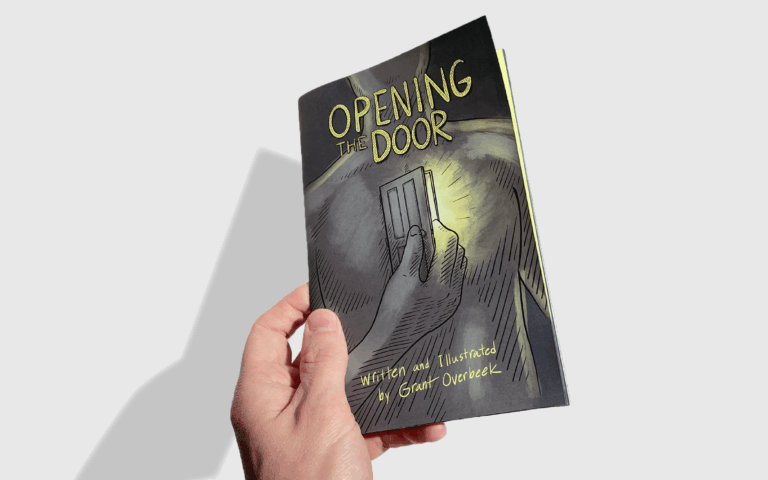The following was offered at chapel for Asbury Theological Seminary:
A mom of a gay teen recently reached out to me. She shared that, as a child, her son seemed to just glow with a love for life. He was always eager to read his Bible and lead the family in prayer before dinner and contribute during Sunday school.
Then he went through puberty, and the golden glow dimmed. The light went out.
By the time the teen shared with his mom that he was attracted to other guys, he was teetering between whether God is cruel or whether the Bible is a joke. Or whether God is real at all.
The mom was desperate.
So we hopped on the phone, and at one point she tearfully asked, “I think I know what’s true about all this LGBT+ stuff. But is God’s wisdom good for my child? Will it be beautiful? I’m his momma. At the end of the day, I just want my boy to be happy. I can’t stand the idea of him living some tortured life. Like, if he actually chose to follow the Bible, would the golden glow come back? Would he live an amazing, joyous life full of love? Or to obey God, do I have to make peace with the fact that my kid’s life is just going to be a lot of cross-bearing? Do I have to accept that, at best, my baby is staring down a lifetime of miserably tragic faithfulness?”
Oof.
I wish I could reassure her that among the gay people I know who grew up in the Church, it’s been story after story of people who held onto historic sexual ethics and flourished.
But I couldn’t lie to her. Or you.
Too often, what’s true has led to bad and ugly
Instead, way too many of the people in my life who started out as gay Christians committed to historic sexual ethics weren’t a Christian at all by the time they were 30.
Too often, it’s gone something like this:
Back when my gay Christian friends were in middle school, they were more sold out for Jesus than anyone else. In high school and into college, they memorized Scripture and shared the gospel and discipled others more than anyone else I knew. But underneath all of that, they were carrying a weighty secret: they were gay.
And alone in the darkness of their closet, the Enemy tortured them. With loneliness, anxiety, addiction, doubt, depression, and suicidality. Eventually they couldn’t keep all of that down. Those wounds of the closet eventually made their way to the surface, and they overtook my friends’ earnest attempts to love Jesus with all of their heart and with all of their soul and with all of their mind. They came out of the closet crippled, hoping to find care in the Church to heal the damage done by the closet and find a way to glow again.
But more often than not, my gay Christian friends were met by Christian leaders who had no idea how to care for my friends and who often made it worse. Christian leaders shamed my friends for merely experiencing same-sex attraction and told them that if they really loved Jesus, their same-sex attractions would go away completely. Christian leaders policed what words my friends could use to describe their sexuality and doubted their salvation if they used the wrong ones. Christian leaders doled out harsh punishments for any sexual sin my friends committed from their wounded state while turning a blind eye to the sexual sins of straight people. And Christian leaders responded to my friends’ cries of loneliness by telling them to rely on Jesus alone, and then the Christian leaders went home to their spouses and kids.
Years of this torture eventually ripped away the faith of my gay friends. The relentless pain and shame and loneliness made it nearly impossible for them to believe that a good God existed. Eventually, all that pain convinced many of them that there’s likely no God at all.
Because of those stories, I could empathize with this mom I was on the phone with.
She was afraid that God’s wisdom wouldn’t be good or beautiful for her kid. She felt like her only options were to condemn her child to a life of bad and ugly or reject the Bible’s wisdom and suffer whatever the consequences might be. She didn’t like these options. They didn’t seem fair. Some part of her, deep down, knew this wasn’t how it was supposed to be. She knew something was off. It bothered her.
Have you ever felt that?
Have you known what you believed about sexual ethics, known what God’s wisdom seems to be for gay people, known what is true, but then seen that fail to lead to good and beautiful results in the lives of same-sex attracted Christians who lived according to what was true? It seemed to just lead to bad and ugly, right? And you know that’s not how it’s supposed to be. Something’s off. Deep down, you know something has got to be different.
What’s true should lead to good and beautiful
In those verses we heard earlier from chapter four of Paul’s Letter to the Church in Philippi, Paul seems to be getting at the fact that what’s true, what’s honorable, what’s just, what’s pure, what’s pleasing, and what’s commendable are supposed to go together. St. Thomas Aquinas, among others, have commented on how Christians have an inherent sense that what’s true should also be good and beautiful. What’s good should be beautiful and true. What’s beautiful should be true and good. We intuitively know that God made the world in such a way that what’s true, good, and beautiful should coincide. They’re supposed to coexist.
So when it comes to sexual ethics, it’s not good enough for historic Christian sexual ethics to be (just) true. If they’re really true, they must lead to good and beautiful things in the lives of gay Christians who follow them, right?
So how do we fix it? How do we make good, beautiful, and true line up when it comes to the sexual minorities that we love?
Some argue that biblical sexual ethics is the problem and that Christians simply need to abandon Christ’s wisdom as they’ve known it. But that “solution” ultimately leads to bad and ugly of a different kind.
Abandoning what’s true isn’t the solution
Unfortunately, most of my gay Christian friends who have abandoned historic sexual ethics for an ethic that condoned gay sex eventually stopped believing in God. Many of them have followed a sad, but logical trajectory:
At first, they performed theological acrobatics to read the Bible in support of same-sex marriages. Then after a while, they reluctantly agreed with a majority of queer theologians who say that the Bible probably says what Christians have understood it to say for 2000 years: the God of the Bible condemns gay sex and gay marriage. Yet my gay Christian friends continued to believe that the *real* God supports gay marriage. The Bible must just be outdated and lack authority or relevance for modern people. But once my gay Christian friends decided that the Bible and the Church couldn’t tell them who God is, they realized they were just worshipping a God they came up with in their own minds. And they wondered, “What’s the likelihood that the God of my imagination is even real?” Eventually they stopped believing in God all together.
Today, very few of the gay Christians I know who have held that progressive sexual ethic for at least five years can make an unqualified confession of a historic understanding of the Nicene Creed and denounce mutually exclusive claims.
Perhaps this trend is an anomaly among the gay people I know, but when I share this observation publicly, gay and straight people consistently private-message me, “Wow, I thought this was only happening to *my* friends. I’ve been afraid to speak up.”
Plus, we shouldn’t abandon a historic Christian sexual ethic, because it’s still true. Despite what I’ve seen in the lives of many sexual minorities in my life, I am still convinced that Christ’s wisdom is what we’ve known it to be for the past 2000 years.
What’s true is still true
When I read all of Scripture with the historic Church (not just the clobber passages), it seems undeniably clear to me what God’s best is for our sexualities. God made every single one of us for connection in the context of community. He designed two vocations, two paths for the best ways to enjoy connection in the context of community:
- Vocational Singleness, defined as a lifetime vocation of abstinent singleness for the sake of serving the poor and needy with single-minded focus and attention, or
- Christian marriage, defined as a lifetime marriage between one Christian woman and one Christian man with an openness to raising children for the sake of the kingdom
Both are a call to lifelong, lived-in human family. Both are a call to lay down one’s life to bring forth the kingdom. Both are a call to be transformed by the Holy Spirit so that we can experience fullness of life and more fully love God and each other!
And God has in mind either the gift of vocational singleness or the gift of Christian marriage for each of us, and He wants us to seek His gift, embrace it, and thrive for a lifetime. God’s best for everyone, regardless of sexual orientation, is either vocational singleness or opposite-sex Christian marriage.
And, I’m convinced that that’s God’s best for me. I can’t help but recognize that there’s no context for same-sex romantic or sexual activity that God blesses. Or to put a finer point on it, same-sex romantic and sexual activity are sins. So yeah, I’m still convinced that historic sexual ethics is true, and progressive sexual ethics leads to even more bad and ugly.
So if abandoning historic sexual ethics isn’t the solution, then what is?
Well, to borrow from St. Thomas Aquinas again, we’ve got to actually love gay people. What do I mean by that? St. Thomas Aquinas said that to truly love someone, you must will the good of the other.
The Church must will the good of gay people
To actually love someone, it’s not enough to just be kind, to just make them feel warm-fuzzy. You’ve got to want them to connect with what’s **actually** good, what’s **truly** good. And we know what’s good by reading the Scriptures with the historic Church.
But it’s not enough to just **want** them to experience what’s good. We have to WILL the good of the other. We have to take action to help them connect with what’s good. We have to do what it takes to bring the good within their reach. That’s what the Church has to do for gay people. To get what’s true to lead to good and beautiful, the Church has to actually love gay people by doing what it takes to make a life of thriving accessible. Within reach.
Unfortunately, the Church has been doing the opposite for decades, but if we recognize the patterns among the ways we’ve gotten in the way, we can reverse engineer the solution to making God’s wisdom good and beautiful for gay people.
You see, sometimes intentionally, but even more often accidentally, pastors and parents have put the Bible’s wisdom into action in ways that made it harder for same-sex attracted Christians to faithfully steward their sexualities. In particular, the Church has struggled with three big blind spots when it comes to willing the good of gay people: we’ve enabled the wounds of the closet, propagated a double standard of sexual stewardship, and left long-term singles without family in the body of Christ. But your generation has the opportunity to diagnose and address these blind spots in a way that leads to willing to good of the other for gay people.
That begins with noticing our blind spots.
The blind spots leading to bad and ugly
Churches have typically been silent about Christ’s love and wisdom for gay people until after a teen comes out, enabling the trauma of the closet. Kids haven’t known whether their parents or pastors are safe to share with, so they chose to go into the proverbial closet and make sense of their sexuality without the love and wisdom of parents, left alone with the lies of the Enemy and culture. They were tortured in the closet and accrued closet wounds like loneliness, anxiety, shame, depression, sexual sin, addiction, abandoning God’s wisdom, suicidality, and loss of faith. By the time they came out, most had already abandoned historic sexual ethics or a belief in God altogether, and it was too late.
For those who held onto the Bible’s wisdom, once they did share, they faced a painful double standard. Pastors taught that merely experiencing same-sex attraction was a sin or propagated ex-gay theology that led millions of sexual minorities to lose their life or faith or policed what words gay people use to describe themselves or barred them from church leadership even if they were celibate. Pastors told same-sex attracted Christians to be content with celibacy, but then they looked the other way when it came to accountability for straight sexual stewardship. They ignored what the Bible had to say about every Christian discerning vocational singleness and Christian marriage, ignored what the Bible had to say about openness to raising children for the kingdom in Christian marriage, and ignored what the Bible had to say about unbiblical divorce and remarriage. Instead, they taught that straight Christians needed romance and marriage to be happy, whole people. They ho-hummed about the pornography epidemic and casual romance and sex outside of marriage and just offered marriage as a remedy for weakness. This inconsistent, hypocritical application of Scripture tempted sexual minorities to adopt a victim mentality and reject sexual morality standards because of the apparent double standard.
Then if faithful gay Christians somehow managed to avoid that destructive victim mentality and tried to walk out lifelong singleness, they realized that no one in their church was thriving in long-term singleness (or knew how to). Instead, they got stuck in a revolving door of small groups and roommates, starved of a consistent experience of family in the body of Christ. Or they learned to avoid the pain of loneliness by just accepting they would be alone for the rest of their life and slipping into a gray solitary existence.
All told, the Church has not only failed to help same-sex attracted Christians thrive according to God’s wisdom, but the Church has actually made it harder for gay people to be faithful, getting in the way of the good and beautiful God has wanted to offer gay Christians following historic sexual ethics.
But it doesn’t have to be that way.
You’re the next generation of leaders in our churches. You can allow the Holy Spirit to transform our churches into places that will the good of the other for gay people. How?!
I’ve got three suggestions: Protect kids from the wounds of the closet by making sure they never enter the closet in the first place, raise the bar for everyone’s sexual stewardship leading to life-giving holiness for everyone, and ensure vocational singles find lifelong lived-in family.
Three ways to make God’s truth both good and beautiful
First you can protect kids from the wounds of the closet by making sure kids know their parents are safe, know about Christ’s love and wisdom for them, share as soon as they notice same-sex attractions, and never have to enter the closet in the first place. How? We’ve got to equip every Christian parent to lead their kids in age-appropriate conversation about God’s love and wisdom for LGBT+ people before puberty to demonstrate safety and invite children to share about their sexuality—all so that kids share early and parents can help kids embrace the Bible’s wisdom and avoid the wounds of the closet.
And you don’t have to wait until you’re a parent or a pastor to do something about this. Upskill now for conversations with the next generation in your community. There’s lots of great resources out there for having conversations with kids about faith and sexuality. I’m biased, but I think Equip’s Parent Course is the best resource out there. It’s comprehensive, complete with conversation guides and scripts chunked by age range on every tricky topic. And it’s developed by my co-worker who was a public high school teacher before becoming a mom of two kids and is an expert in helping parents have these conversations with their kids. You can check that out at Equip’s website.
Okay, second, you can help make God’s wisdom good and beautiful for gay people by raising the bar for everyone’s sexual stewardship, leading to life-giving holiness for everyone. We’ve got to invite everyone to steward their sexualities according to God’s good and weighty wisdom. This might include exploring whether straight Christians are engaging in casual romance, having sex outside of marriage, making little or no progress on refraining from the use of pornography, failing to consider a call to vocational singleness, unthinkingly refusing an openness to raising children for the kingdom in marriage, or engaging in unbiblical divorce/remarriage. And then provide all Christians with the support they need to resist temptation and thrive according to historic sexual ethics.
Now, I know this might sound like returning to some kind of legalism. Or appeasing the complaints of sexual minorities by making life harder for straight people. But it’s neither of those. If we’re honest, compromising on God’s wisdom for straight people may have been convenient in the short-term, but it has consistently hurt straight people in the long-term. Straight Christian marriages have ended in divorce at the same rate as non-Christian marriages, and unmarried straight Christians have also suffered from a lack of support in the church. But if instead, we raised the bar for everyone’s sexual stewardship, it would not only protect same-sex attracted Christians from that destructive victim mentality, but also free straight Christians to experience life-giving holiness and fullness of life that can only come from fully embracing the Holy Spirit’s wisdom for our sexualities.
Plus, you don’t have to wait for your church to do this. You can raise the bar in your own life. Perhaps you could re-examine those passages of Scripture and theological ideas that might be inconvenient for you and others have made it easy to explain away. Have you convinced yourself that if you want to marry or have kids, that means God has called you to marriage? Have you convinced yourself that you don’t have to wait for a calling from God to marriage, you can just start dating and go take it? Have you convinced yourself that if you find abstinent singleness difficult, that means you’re called to marriage? Have you convinced yourself that it’s wise to use marriage as a remedy for weakness and bring sexual addiction into a marriage? Have you convinced yourself that Christians across the ages would approve of marriage as a permission slip for sex without any openness to raising children? Make time and space to re-examine those assumptions. And let yourself wonder whether you or your church has credibility to invite gay Christians to a high standard of sexual stewardship if you’re making those compromises with Scripture yourself.
Third and last, you can help make God’s wisdom good and beautiful for gay people by ensuring vocational singles find lifelong lived-in family, regardless of sexual orientation. To build a foundation for that, we’ve got to teach what the Bible has to say about vocational singleness, guide teens and young adults to discern whether they are called to vocational singleness or Christian marriage, hire vocationally single leaders and pastors, and celebrate the callings of those called to vocational singleness. Then we can help vocational singles start intentional Christian communities by suggesting the idea, helping them cast vision for it, providing pastoral support while they explore the possibility, coaching them through the process, and even providing financial support in the early years.
What can you do about that today? Well, particularly if you’re already married or eventually get married, let yourself be burdened by the responsibility of helping your friends walking out long-term or lifetime singleness build the kind of family in the body of Christ that would truly meet their needs for companionship. Don’t harden your heart to their need, but don’t try to hastily rid yourself of that responsibility by offering marriage as the solution to their loneliness.
Honestly, that goes for each of these blind spots.
Protecting kids from the wounds of the closet, raising the bar for everyone’s sexual stewardship, and ensuring vocational singles find lifelong lived-in family will be tough work for the next generation of Christian leaders. For you. It’ll be tempting to find some way to throw off that burden.
It’ll be tough, but it’ll be worth it
But, much like the mom I spoke with on the phone about her gay son, I hope you’ll allow yourself to be bothered by the disconnect between what’s true, good, and beautiful. It made her uncomfortable. She could have run away from that discomfort by abandoning historic sexual ethics. Or by tuning out the cries of those hurting on the margins. But she didn’t.
Like her, I invite you to love. St. Thomas Aquinas style. Let yourself be burdened by the responsibility of doing something to make the good more accessible. And then do something about it.
To help you along, I want to leave you with some hope.
There’s already hopeful signs…
While our churches have struggled to bring the good and beautiful within reach for the average gay Christian, there’s been a small minority of gay Christians committed to historic sexual ethics who’ve been guided by the Holy Spirit to find a path forward. And it’s been working.
In addition to Asbury’s own Dr. Janet Dean, Olya Zaporozhet and Mark Yarhouse are research psychologists who have been studying gay celibate Christians who have accepted the fact that their sexual orientation isn’t going to change yet continue to be convinced of the Bible’s wisdom and are trying to make sense of their faith and sexuality often in fairly public ways. And their research has found that these gay celibate Christians scored in the normal range of mental health compared to the average American. And scored higher than average overall life satisfaction.
In contrast to the bad and ugly that both a progressive sexual ethic and pray-the-gay-away theology lead to, these gay Christians are experiencing spiritual and psychological health by stewarding their sexualities according to historic sexual ethics. Thanks to the Holy Spirit, some have seemingly miraculously carved out a path of good and beautiful.
I’ve seen this play out in my own life.
It’s been particularly through submitting my enduring brokenness to God and asking Him how He wants to redeem that brokenness for His glory and my good that the best things in my life have come about. Saying “yes” to Christ’s wisdom has led to the greatest sources of purpose and belonging in my life.
Saying “yes” led to me getting to start Equip 10 years ago. Since then we’ve trained over 30,000 Christian leaders to protect the next generation of kids from those painful wounds of the closet and build a Church where they can actually thrive according to historic sexual ethics.
And saying “yes” led to me getting to start an ecumenically Christian monastery back in 2018 for men in Nashville called to vocational singleness and looking for lifelong, lived-in family to empower their faithfulness and kingdom work.
Today, that’s my family.
In the Nashville Family of Brothers, I get to live with five other Christian guys committed to vocational singleness, pray together, share family meals, and do holidays and vacations together. I’ve actually made lifetime commitments to vocational singleness and to this family, and I know who some of the guys are who will see my ugliest parts but won’t run away, who I’ll grow old with, and who will hold my hand when the people we love pass.
Imagine a Church where my story isn’t uncommon, but instead ordinary. Imagine a Church where gay Christians don’t have to hope for a miracle, but instead God’s good and beautiful for them is within reach. Imagine a Church where we’ve become accustomed to God’s true for sexual minorities leading to undeniably good and beautiful. Aided by the Holy Spirit, I hope you’ll say “yes” to leading the Church and transforming it into a place that wills the good of gay people–that loves gay people.
Would you pray with me?
God, you see the ways Your truth isn’t seeming to lead to good and beautiful in the lives of gay people. You see their pain as gay Christians are trying to follow your wisdom. I hope you’ll give this next generation of Christian leaders the wisdom to see how your Church can make Your truth undeniably good and beautiful. And I hope you’ll give us the courage to do something about it.
Amen!






